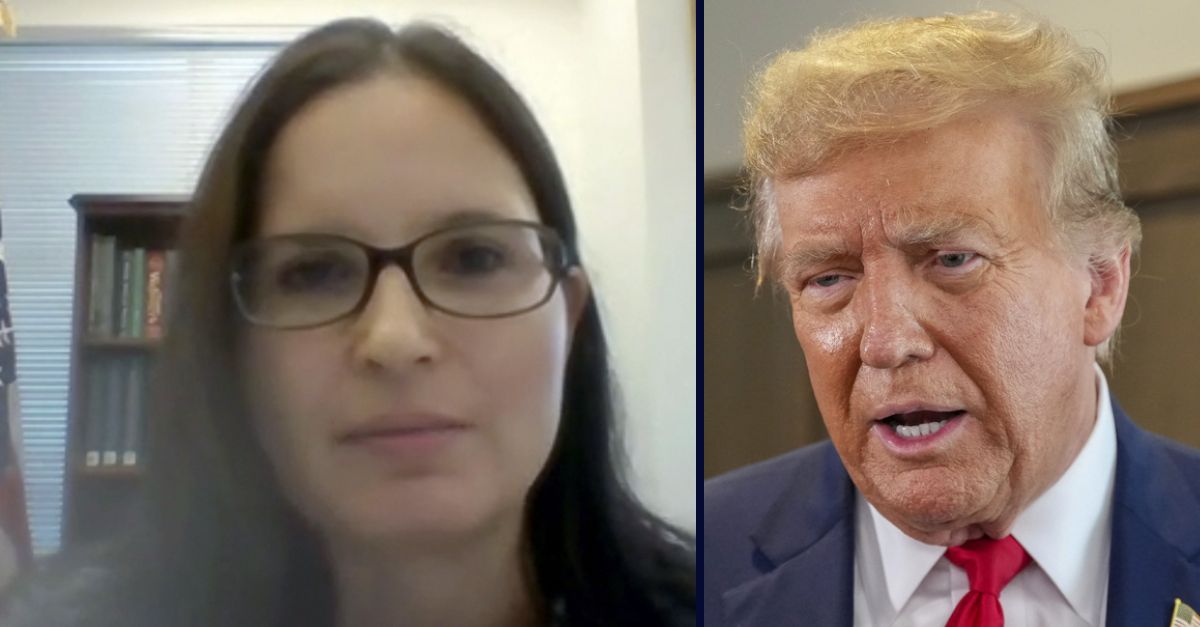
Left: Aileen M. Cannon speaks remotely during a Senate Judiciary Committee hearing (U.S. Senate); Right: Republican presidential candidate former President Donald Trump visits a Chick-fil-A eatery, Wednesday, April 10, 2024, in Atlanta. (AP Photo/Jason Allen)
The judge overseeing Donald Trump’s Mar-a-Lago documents case just raised the specter of sanctions against one of the parties for only the second time. And this time, one of the defendants is in trouble.
On Thursday, U.S. District Judge Aileen Cannon released a terse order chiding Trump’s valet, Waltine “Walt” Nauta, for missing a court-imposed deadline and warned that failure to comply with corrective measures issued to deal with the tardiness “may result in sanctions.”
On May 21, the court unsealed several documents — previously filed February and March — related to a once-secretive clash between Trump’s lawyers and special counsel Jack Smith over defense allegations of “prosecutorial misconduct” and due process violations.
As part of the unsealing order, Cannon also directed Nauta to “publicly file” a redacted version of a motion he filed ex parte in September 2023. That motion had asked the court for permission to reference discovery in a sur-reply to the government about a conflicts hearing.
The government called for that so-called “Garcia hearing” because Nauta’s lead attorney, Stanley Woodward, previously and at the time represented several other people interviewed by federal prosecutors in the course of the Mar-a-Lago investigation — and apparently intended to call some of them as witnesses during trial.
The upshot of a Garcia hearing — named after the Fifth Circuit case of U.S. v. Garcia — is that a criminal defendant needs to have a back-and-forth colloquy, or narrative response, with the judge; this has been likened to the process involved in entering a guilty plea. The point is for the defendant to come away from a hearing understanding and accepting, affirmatively, any and all pitfalls of conflicted legal help.
More Law&Crime coverage: The Trump Docket: ‘Tyrant’ judge weighing Trump sentence likely to take note of former president calling him a ‘devil,’ vowing to ‘appeal this scam’
In Nauta’s case, the Garcia hearing went off without any sort of drama; the court ran through a series of questions twice, and established the defendant was not pressured or otherwise coerced to choose his attorney. The judge, using boilerplate language, ultimately found that Nauta had made a “knowing, intelligent and voluntary waiver of any potential or actual conflicts of interest” arising from Woodward’s other clients.
Before that hearing, the defendant had some specific — and kept under wraps — information he wanted to share with the court.
Cannon wanted Nauta’s public version of the hitherto unseen motion to leave out “names of potential witnesses, ancillary names, and personal identifying information.” The filing was due by May 28. That deadline went by, however, with no filing or explanation.
“Defendant Nauta has not complied with that Order, and the deadline to do so has passed,” the judge observed in Thursday’s order.
More Law&Crime coverage: ‘Wholly lacking in substance and professional courtesy’: Mar-a-Lago judge scolds Jack Smith and swiftly shuts down his Trump gag demand, warns of sanctions
Cannon set a June 3 deadline for the redacted motion to be filed.
And, because of the defense’s slip-up, they have a bit of extra work to do. The valet’s lawyers have to “show cause, in writing, why he failed to comply with the Court’s instructions by the original deadline.”
Earlier this week, Cannon criticized the prosecution for its Memorial Day weekend request to issue a gag order against Trump.
In denying Smith’s request without prejudice, the court said the government did not “meaningfully” confer with the defense beforehand — and threatened to impose sanctions if a series of new requirements on how to certify such a conferral were not followed.
Have a tip we should know? [email protected]








